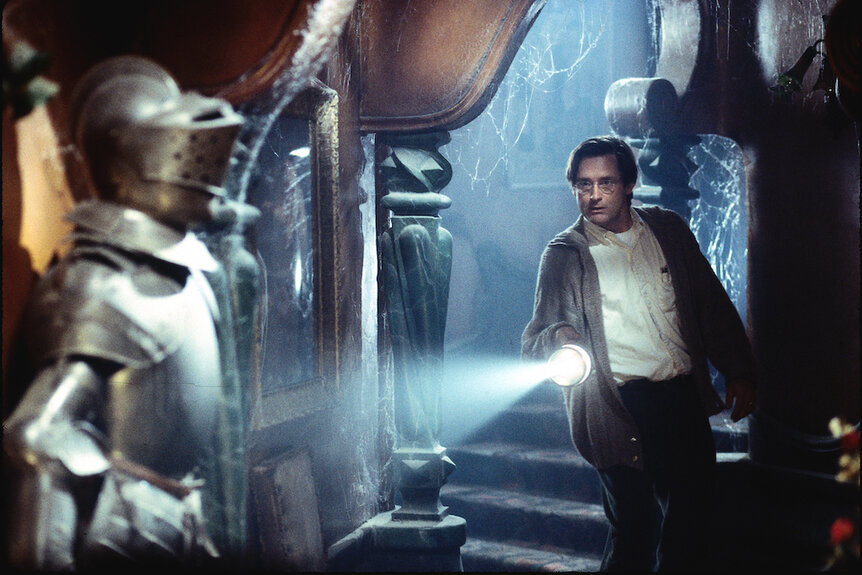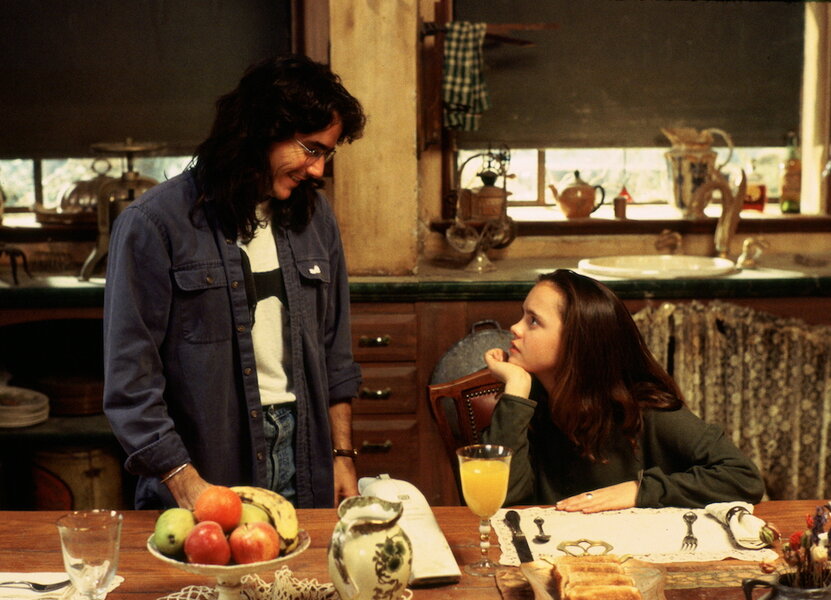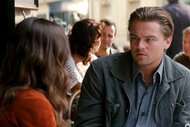Create a free profile to get unlimited access to exclusive videos, sweepstakes, and more!
How Steven Spielberg & J.J. Abrams Helped Bring 1995's Casper to the Big Screen
Director Brad Silberling looks back on his ghostly classic and relationship with the King of Hollywood.

Director Brad Silberling remembers the day his career forever changed as though it were only yesterday. While working on the TV series Brooklyn Bridge in the early 1990s, he got a call from the show's creator, Gary David Goldberg with some news: Steven Spielberg wanted to meet with him. At first, he thought Goldberg was playing some sort of cruel practical joke. That is until he wound up in the Amblin offices on the Universal Pictures lot, being offered a chance to direct his first feature-length film by the King of Hollywood himself.
"He said, ‘I was you [once]. I was in that situation and I needed somebody to have the trust and faith that I could make the leap to start making movies," Silberling recalls of his first meeting with Spielberg. "'I saw the show that you did' — which was an episode of Brooklyn Bridge — 'I could see you were making a movie, but you only had a half hour to make it. I'd love to help you make a longer one.’"
Spielberg wanted to tap him as director for an English remake of a French comedy at Warner Bros. The project ultimately fell apart while the cinematic legend was off in Poland making the seminal Holocaust drama. Schindler's List, but Spielberg never forgot the young moviemaker that showed promise. Right before Thanksgiving of 1993, Silberling was in Hawaii, prepping to shoot a new television show (the short-lived The Byrds of Paradise) when he got another call from the Man on High.
How Brad Silberling became attached as director to 1995's Casper
"He led with, ‘Okay, this one's really gonna happen and it's gonna go pretty fast.’ I said, ‘It’s what?’ And he kind of like muttered, ‘Casper...’ When I finally heard him, I said, ‘Wait, Casper the ghost, Casper?’ He said, ‘Yep. It's gonna be awesome. It's live-action. We finally just cracked the code with Jurassic two years ago, so the ghosts will be CG.’ I thought he was out of his mind and I said, ‘You know what I do? I dated an animator at UCLA, but I don't do animation.’ He was fantastic and said, ‘No, what you do and what’s in your heart is what this movie needs. I didn't know anything about the CG stuff until we were making Jurassic. You’ll be fine.'"
The opportunity was incredible and petrifying at the same time. "I was really scared that it could all backfire," admits Silberling who didn't want to become "one of the many first- and only-time directors littering the beaches of LA." Spielberg might've been an executive producer, but it was Silberling's ass on the line.
J.J. Abrams did uncredited work on the script for Casper
In the end, of course, it was just too good to pass up and he got to work, scrambling to lock down the CGI (courtesy of Industrial Light & Magic), construct the sets, and put together a functional screenplay with uncredited help from Malia Scotch Marmo (Hook) and an up-and-coming J.J. Abrams. "I had J.J. locked in my trailer the first two weeks of shooting," Silberling says of the scriptwriting process, which began with a draft from Animaniacs veterans, Sherri Stoner and Deanna Oliver (they received final credit). "He was just running in and giving me pages and we’d go through them."
He compares the hectic process to the infamous production of Jaws. "Steven made Jaws one night at a time. Yes, there was a script, but they ended up basically improvising every night over dinner and Carl Gottlieb would then capture their improvs and the next day, they'd go to work. So in his mind, it’s a totally valid way to make a movie."
Principal photography was slightly deferred by the Northridge earthquake in 1994, which could have spelled disaster for the already-constructed sets at Universal. Despite its devastating effects throughout the city, the natural disaster actually improved the crumbling old manor house interior where the vast majority of Casper takes place. "It was kind of awesome, because the only thing that happened is the sets had gotten more cracked," Silberling says. "But they were structurally safe and so, we got started."
Bill Pullman and Christian Ricci headlined the film as Dr. James Harvey and his teenage daughter, Kat. Still reeling from the death of his wife, Harvey travels the country as a sort of supernatural therapist, helping spirits resolve their unfinished business and move on to the afterlife. Most people think he's crazy until the father-daughter duo moves into a house haunted by actual ghosts: young Casper (Malachi Pearson) and his three uncouth uncles: Stinkie (Joe Alaskey), Fatso (Brad Garrett), and Stretch (Joe Nipote).
Why Steven Spielberg's longtime editor jumped at the chance to edit Casper
Silberling's initial fears turned out to be unfounded. His being thrown into the deep end of the cinematic pool yielded a new classic — a touching rumination on grief and living life to its fullest that embodied all the youthful whimsy and familial warmth of the classic films contained within his mentor's own silver screen legacy. Aiding him behind the camera were seasoned pros like director of photography Dean Cundey (who had plenty of experience shooting VFX-heavy titles like Who Framed Roger Rabbit? and Jurassic Park), composer James Horner, and editor Michael Kahn (who has cut together every Spielberg movie since Close Encounters of the Third Kind).
"Mike found the whole experience restorative," Silberling remarks. "Schindler's List was such an emotionally taxing movie for them both and he felt like he went into a bit of a depression when the movie was done. So he was constantly like, ‘Oh, this feels great. I'm so happy. This is such an enjoyable film and process.’"
The ghostly digital effects were overseen by ILM's Scott Farrar (on-set supervisor) and Dennis Muren (whom Silbelring describes as "the godfather of the movie from ILM’s perspective"). Silberling also sought out lessons on the fundamentals of animation from Amblimation alum, Phil Nibbelink (director of An American Tale and We're Back: A Dinosaur's Story!).
"Essentially, this was a movie I directed twice, once for 96 days on set and then the rest for the next year and change to get all of the animation done," Silberling explains. When it became clear that the visual effects allotment would invariably go over budget during the storyboarding stage, Spielberg assured the young director. "He said to me, ‘You don't change that game. You have a gift for staging, you know how to work with the camera. Do nothing differently. The only challenge is you know where the ghosts are going to be, you're going to have to really be able to communicate that to everybody.'"
That learning curve turned out to be "vertical," he admits. "It wasn’t a slant, it was just straight up." It was the same trial by fire Spielberg experienced on Jurassic Park two years before. "The kitchen sequence in Jurassic is one of the most extraordinary, suspenseful things ever. He didn’t even know if the dinosaurs were going to work, but again, it's the ballet that he shot, hoping and anticipating that these creatures would make their way in the way he was hoping. And that's what he was saying to me, ‘Make them fit into your movie, don't go the other way around.’"
On Day 65 of the arduous shoot, Spielberg stopped by the set to check on Silberling and give him a little pick-me-up in the form of a joyride around the Universal lot. "He had the first before-market GPS. And so, we were just following the GPS, driving by the Psycho house, going all around the lot. He just was wise, he was trying to distract me, give me a little bit of a good upper. I couldn't have had a greater cheerleader there to go through a totally unknown process, but a really glorious one by the end."
Why didn't we get a sequel to 1995's Casper?
Despite its supernatural elements, Casper was not released in the run-up to Halloween '95. Instead, the film arrived on the big screen over Memorial Day Weekend of that year, bringing in almost $300 million worldwide against a production budget of $55 million. "It was a really substantial moneymaker for the studio. So immediately, there was talk of a sequel. [Steven] and I talked about it," Silberling reveals. "We were hanging out that summer and talked about it, what it might be ... He was starting to say, ‘Well, we made Little Rascals. What if there's a way to combine Little Rascals with Casper? What would that look like?'"
Like Casper himself, the sequel fell into a state of purgatory when Saban unexpectedly scooped up the direct-to-video rights to the Friendly Ghost IP and debuted Casper Meets Wendy three years later. "That killed it off," Silberling explains. "I think, at that point, the worry was that it was sort of tainted and that there was going to be some confusion in the marketplace if they went ahead on a sequel." When the original movie hit its 25th anniversary during the COVID-19 lockdown of 2020, the director received a note from Spielberg, who lamented the fact that they never got to make a second entry. "He was like beating himself up."
Casper director sounds off on ghostly Peacock series
Still, the property isn't completely dead. Back in the spring of this year, Peacock announced that it had entered development on a live-action Casper series from writer and executive producer Kai Yu Wu (Hannibal, The Flash). Officially described by the streaming platform as "a horror/adventure show that reimagines the origin of Casper in a coming-of-age story that explores what it means to be alive," the show will center around a family that moves to the sleepy hamlet of Eternal Falls and befriends the titular friendly apparition. Together, the living and the not-so-living attempt to solve a mystery and uncover dark secrets that have been buried for over a century.
As it turns out, both Silberling and Spielberg have kept a close eye on the project these last few years, with the latter actually signing off on Wu's pitch. Before that, however, Silberling was able to hop on "a wonderful Zoom" conversation with the up-and-coming writer, who is a big fan of the 1995 film.
"She was sort of blushing and said, ‘I have to show you something…’ She showed me this Casper tattoo and said, ‘That movie was, for me, the beginning of wanting to tell stories. It was huge in my youth and I just wanted to get to meet you and ask you questions,'" the director remembers, adding that Wu's vision for Peacock retains "the heart and tone of the film." He concludes: "She's awesome and you will have, as a showrunner, somebody who is really coming from a place of love for the piece. I couldn't be happier."
Casper is now streaming on Peacock.
Originally published Sep 30, 2022.





























